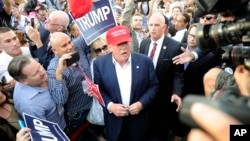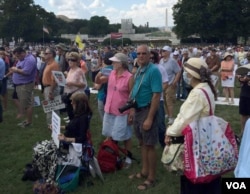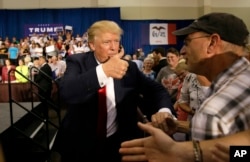Supporters of leading Republican presidential candidate Donald Trump are fearful for their safety, worried about the economy and generally fed-up with the way things are going in the U.S., according to political analysts.
Trump "taps into the feelings of people who are angered, frustrated, disillusioned about the direction of the country," Georgetown University political scientist Stephen Wayne told VOA.
He said Trump supporters, often white men with lower incomes, are worried that they and their concerns have been eclipsed by rapid economic, social and political changes in the United States, where the population of racial minorities is growing and marriage of same-sex couples has been legalized.
"There is the rise in [income] inequality" in the United States as well, Wayne noted, with corporate executives earning hundreds of thousands of dollars annually and "a lot of people just living paycheck to paycheck to get by."
YouGov market researchers and the Pew Research Center both say that Trump's supporters are less educated and earn less than many voters.
About a third earn less than $50,000 a year, according to YouGov, and just 11 percent make more than $100,000.
The person, not the ideology
Trump supporters are not particularly ideological, say YouGov market researchers David Brady and Douglas Rivers. In recent YouGov polls, 65% of Trump's supporters said they were "conservative" while 20% percent identified themselves as "liberal" or "moderate." Only 13% identified themselves as "very conservative."
Perhaps this lack of cohesive belief is why they are responsive to Trump, the personality. The one-time reality television star has been "incredibly successful in directing media attention to himself as a person, rather than the other candidates and their credentials and skills," Wayne said. "So far, the campaign is all about Trump."
One survey of the presidential candidates' official Facebook pages even concluded that Trump supporters make more grammar mistakes when posting comments than those favoring other candidates.
YouGov found that half of Trump supporters have a high school education or less, compared with 19 percent who have a college or post-graduate degree, with Pew Research reporting similar results in its polling.
"Definitely not country club Republicans, but not terribly unusual either," YouGov researchers David Brady and Douglas Rivers concluded.
Fear of terrorist attacks
Some voters, especially Republicans, appear unnerved and fearful that the country is not safe from terrorist attacks — worries that Trump and other Republican candidates have made central to their campaigns.
Muslims make up less than one percent of the 322 million Americans, but some people worry that if more Muslims seek refuge in the U.S., they could pose a security risk or — at the least — would bring unwanted change to the country.
Poll after poll in recent months has shown that Republicans, substantially more than Democrats and independents in the U.S., would not vote for a Muslim as president, believe that "the values of Islam are at odds with American values," think that Islam is "inherently violent," and say that the U.S. government should monitor Muslims as "potential terrorists."
One survey a few months ago showed that 66 percent of Trump's supporters believe President Barack Obama is a Muslim, despite the American leader's public profession over the years of his Christian faith, and 61 percent said they believed Obama was born outside the U.S., which would have made him ineligible to be president.
In a White House speech Sunday, Obama said Americans must not give into fear of terrorism and Muslims. But within hours, Trump called for blocking the entry of Muslims into the country, a suggestion condemned by the White House, his Republican and Democratic presidential opponents, British Prime Minister David Cameron and others.






